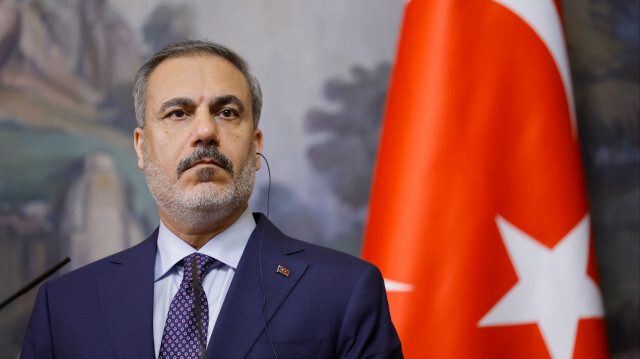
Hakan Fidan, his Greek counterpart George Gerapetritis, to discuss bilateral ties, regional issues, preparations for 6th High Level Cooperation Council meeting between leaders of two countries
Turkish Foreign Minister Hakan Fidan will visit the Greek capital of Athens in the second week of next month, officials said on Tuesday.
Fidan's tour will be a reciprocal visit following Greek Foreign Minister George Gerapetritis' working visit to Ankara on September 5, 2023.
One of the agenda items for his visit to Athens is preparations for the 6th High Level Cooperation Council meeting between Turkish President Recep Tayyip Erdogan and Greek Prime Minister Kyriakos Mitsotakis, which is scheduled to take place in Ankara next year.
During his visit, Fidan and Gerapetritis are also expected to discuss bilateral relations as well as regional issues, particularly those concerning the Middle East.
- Türkiye intends to maintain positive momentum in relations with Greece
Greece and Türkiye's relations have recently gained positive momentum, which Ankara intends to maintain, the officials said.
As stated in the Athens Declaration on Friendly Relations and Good Neighborliness, signed by Erdogan and Mitsotakison on Dec. 7, 2023, Türkiye continues to focus on areas of cooperation that benefit both countries.
Despite areas of disagreement with Greece, the officials said several issues can be reconciled and that this is the shared desire of the two countries' leaders.
Türkiye stresses that Turkish and Greek authorities must work together in order to benefit the people of both countries while also enhancing regional stability and peace.
- Discussions on Aegean disputes continue
According to Turkish officials, while the two countries' positions on Aegean issues have not changed, it is impossible to reduce the Aegean disputes to a single item, as all interconnected disputes at sea and in the air are under consideration.
Türkiye wants a permanent, comprehensive, and equitable settlement of all disputes, including territorial waters and airspace, geographical formations of uncertain ownership, the armament of islands with non-military status, and the flight information region (FIR) under international law.
It is reported that the Aegean issues were discussed in 64 rounds of exploratory-consultative talks between the two countries between 2002 and 2022, with some progress made but no further progress achieved when the Greek side reverted to the “there is only one dispute” discourse.
According to the officials, if the negotiations fail, the disputes can be brought before the international judiciary as a whole, but Greece must first remove its reservations about the jurisdiction of the International Court of Justice (ICJ).
- Türkiye ready to cooperate on environment, energy in Aegean region
Underlining Ankara's readiness to cooperate in the Aegean in areas such as the environment, energy, scientific research, combating illegal migration, and search and rescue, the officials also emphasized that unilateral steps should be avoided by both countries.
They reiterate that both sides have vital interests in the Aegean, but they want to keep it as a shared sea, whereas the Turkish side supports joint implementation of environmental projects such as marine parks and marine planning.
- Issue of Heybeliada Seminary
The officials said Greece's tendency to present issues related to the Greek minority in Türkiye, such as the Heybeliada Seminary, as a matter of universal religious freedom or human rights that concerns the international community, has been observed for a long time, underlining that an understanding such as “the Greek minority is a matter for the international community, while the Turkish minority in Western Thrace is only a domestic issue for Greece” will not be accepted.
Calling on Athens to stop practices such as denying the Turkish minority's ethnic identity, not recognizing its elected religious leaders, de facto restricting its educational opportunities, the officials said Türkiye sees the Greek minority as a richness and a bridge of friendship with Greece and Greece should see the Turkish minority in the same way.
The officials emphasize that Greece is also expected to review its approach to Turks in areas that are not covered by the Treaty of Lausanne, stating that even though Turks living in Thessaloniki, Rhodes, and Kos do not fall within the framework of minorities defined in the Treaty of Lausanne, Greece is expected to take steps toward them based on universal values and in accordance with today's human and minority rights.

